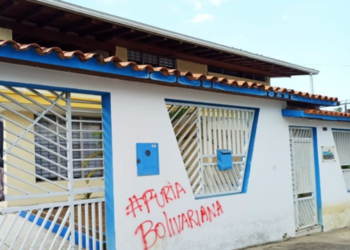A wave of repression by President Nicolás Maduro’s administration in Venezuela has paralyzed opposition candidates in the lead-up to the 2024 presidential elections.
On January 26, Venezuela’s Supreme Court (Tribunal Supremo de Justicia – TSJ) upheld a ban preventing María Corina Machado from holding office, thus disqualifying the leading opposition candidate from running in the elections. Maduro’s government had agreed to hold elections during meetings held in Barbados last October under international supervision.
The TSJ decision was the culmination of a series of increasingly repressive actions. Since January 23, security forces have detained three members of Machado’s presidential campaign, including campaign manager Juan Freites, who local news outlet Pitazo Vargas reported was ambushed in front of his house and hustled into the back of a black van.
The detentions come in a year when Maduro’s regime, whose rule saw the exponential growth of the symbiosis between organized crime and state elements, is expected to confront a significant challenge to its power during the elections.
The opposition members’ detentions followed an announcement from Venezuela Attorney General Tarek William Saab that, since May 2023, his office has uncovered five terrorist conspiracies involving military officials, civilians, and foreign intelligence networks. Since then, authorities have arrested more than 30 people in connection to these alleged coup plans and issued arrest warrants for another 14, including journalists and civil society leaders.
These actions seem to be part of Maduro’s most recent campaign of repression, which started with the announcement of “Plan Bolivarian Fury” (Furia Bolivariana), in which he promised to deploy military and police troops starting on February 22, to “thwart any terrorist and coup attempts, no matter how they are presented.”
For her part, Machado described Plan Bolivarian Fury as a campaign of political repression.
“How do you run a campaign if your people are kidnapped and disappeared?” she said in a televised press conference. “I call on the international community to stop this madness because that’s what Bolivarian Fury is — aggression, disappearances, and persecution.”
In recent days, the headquarters of a growing number of opposition political parties and non-governmental organizations (NGOs) have become the targets of vandalism, often featuring graffiti reading “Bolivarian Fury.”
The United States also expressed alarm over the deteriorating situation.
“The decision by Venezuela’s Supreme Tribunal of Justice to uphold [the] disqualifications … undermines a competitive presidential election. Based on this action and targeting of opposition and civil society, the US is reviewing our sanctions policy,” State Department Spokesperson Matthew Miller wrote in a post on X.
InSight Crime Analysis
The ban on María Corina Machado paralyzes the opposition presidential campaign. Combined with the latest wave of repression, it makes clear that Maduro will not allow the opposition any oxygen to run against him.
“He still holds all the cards,” Geoff Ramsey, Senior Fellow at the Atlantic Council, told InSight Crime, referring to Maduro. “If the international community is expecting free and fair elections in Venezuela, held to the standards of, let’s say, Switzerland, it should wait sitting down.”
Maduro launched his campaign of fear the day after Machado presented her campaign mobilization plan, suggesting that Machado’s popularity — highlighted by the unexpectedly large number of people who turned out to vote in the opposition primaries — caught him on the back foot.
The regime’s response to the perceived threat to its hold on power has been swift.
“First, they want to do what they can to depress the odds of major opposition-led protests,” Ramsey said. “Second, they want to send a message to their own base to mobilize against the opposition.”
SEE ALSO: The Future of Venezuela’s Hybrid State
Amid these attacks, the government also announced that the National Constituent Assembly would pass a law targeting Venezuelan NGOs, which has been stuck in the country’s legislature for almost a year.
Representatives of some Venezuelan NGOs say the law is made to silence them — and not just them.
“It would restrict absolutely everyone — the unions, the media, and even the condominium boards — everyone that promotes citizen participation and meetings in the streets, even civic ones,” Gabriela Boada, director of Caleidoscopio Humano, a Venezuelan NGO dedicated to human rights, told InSight Crime.
The storm of repressive actions and threats represents a sharp turn away from what seemed to be progress toward a peaceful solution in Venezuela, following negotiations to bring the country back into the international fold.
Regional and global partners have resumed diplomatic relations with Venezuela. Among the most prominent examples of this thawing is that the Venezuela-Colombia border has re-opened, and the United States eased crippling sanctions on many of Venezuela’s industries, including petroleum.
However, this week’s events could reverse the progress.
It’s not clear what the US reaction will be to the upheld ban. The United States had previously promised to suspend sanctions relief if Maduro did not make “adequate progress.” Still, Ramsey is skeptical the United States will follow through on its threat to reimpose strict sanctions.
“The US and its allies around the world are increasingly looking at Venezuela not only through a political lens but also through a geo-economic one,” Ramsey told InSight Crime.
Featured image: Graffiti referencing the Venezuela citizen control campaign, the Plan Bolivarian Fury. Credit: CEPAZ

